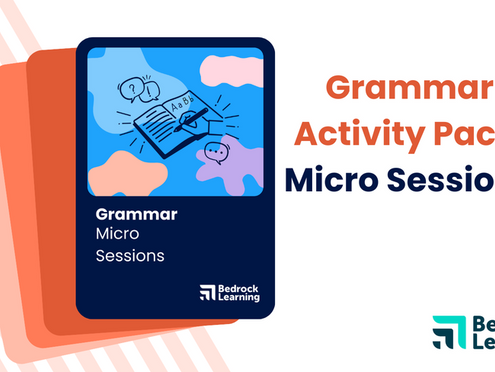What is grammar?
'Grammar is the system of a language – the ‘framework’ that governs how it’s spoken and written and helps it make sense. It’s the glue that holds everything together. Imagine a newspaper article without capital letters, punctuation marks, sentence breaks or spaces between words. It would be almost impossible to understand!
Grammar is a compulsory element of the National Curriculum, which means learners have to understand and be able to use a range of specific grammatical features.
When you hear ‘good grammar’, it means speaking or writing in a way that follows established guidelines. This includes sentence construction, punctuation and spelling.
When learners are taught grammar at school, they learn basic terms like 'noun', 'adjective' and 'verb' that many parents will recall being taught. However, other terms, such as conditional clauses and subordinating conjunctions, may be more unfamiliar. Our grammar glossary explains grammar terms from the National Curriculum that a learner might encounter. However, understanding grammar is more than being able to name parts of a sentence.
Why is grammar important?
Even in a world full of emojis, texting and slang, grammar still matters in many contexts. Learning key grammatical terms helps learners write and speak effectively – grammar is a crucial part of communicating with others.
Grammatical errors can confuse the meaning of what is being communicated, and this can affect the way someone is understood and perceived. Poor grammar can detract from what someone is trying to convey and, worse, can confuse or even change the meaning of what’s being communicated.
Consider Lynne Truss’ famous illustration of the importance of commas in Eats, Shoots and Leaves. If you wrote, ‘Let’s eat, Grandma,’ people would understand you were inviting her to a meal. But if you wrote, ‘Let’s eat Grandma,’ you would sound much more sinister!
What are the benefits of learning grammar?
There is a lot of debate about whether learners should be taught the grammar of standard English in schools. Some people argue that being able to label a ‘fronted adverbial’ isn’t very helpful, and we should focus more on creativity and expression. Others contend that teaching what is a ‘right’ and ‘wrong’ way of speaking devalues local dialects and benefits learners from specific backgrounds over others.
While the learning of grammar ‘rules’ doesn’t instantly make people better communicators, it can provide an understanding of how language works and help your child be a more reflective, considerate writer and reader. This useful framework can help a learner convey exactly what they want to express. It helps with creative writing, persuasive speeches, formal letters – everything!
As well as this, the ability to convey emotion has a large impact on emotional wellbeing. A learner that is unable to communicate effectively how they feel is more likely to misbehave, lash out or stop being engaged. Not only does an understanding of grammar rules help learners in the classroom, but it also helps them advocate for themselves, a skill with lifelong benefits in every situation.
An understanding of grammar also plays an important role in reading at GCSE, in which learners analyse texts. A secure understanding of the rules of grammar will help learners identify and explain choices writers are making. This could be how questioning how language is used for impact, or even identifying places where grammar rules are deliberately broken for effect.
With grammar irrefutably still important, it’s easy to see why the National Curriculum attaches such importance to the understanding of grammar, and why a proficiency in it is essential in order to achieve the top grades at GCSE. It’s also a skill that has use beyond school: clear communication is critical at every stage of a learner's life.
When are learners taught grammar in school?
At Key Stage 1 (Years 1 and 2), learners are introduced to basic spelling, grammar and punctuation (SPAG). The Year 2 SATs include a non-statutory SPAG test that many students complete.
During Key Stage 2 (Years 3-6) children learn – and must show that they can understand and use – more complex grammatical terms. These include passive verbs, modal verbs and expanded noun phrases. The Year 6 SATs include a SPAG paper that assesses their understanding of how the English language works.
At Key Stage 3 (Years 7-9), students build on their learning from primary school and develop their understanding of how language works in reading, writing and speaking.
By GCSEs – Years 10-11, also referred to as Key Stage 4 – lessons start to focus on experimenting with language, analysing writers’ choices and developing students as writers.
You can familiarise yourself with some of the terms your child will be taught in our grammar glossary for parents.
How can Bedrock help?
Designed by English teachers, Bedrock's grammar curriculum is a video-taught, human-narrated grammar curriculum, designed to lead learners through the grammar they need to communicate effectively.
Not only does Bedrock's grammar curriculum teach learners to identify grammar techniques, but its 80+ bespoke activities instil in learners a mastery of grammar techniques.
Learners using Bedrock's core curriculum complete free-writing tasks, explore original fiction and non-fiction, and even play games - all of these activities work together to provide a consistent, contextualised grammar curriculum for learners of all ages.
If you're wondering how you can help your child develop their grammar skills, ready to enter a world dependent on effective communication, Bedrock is a great place to start.




